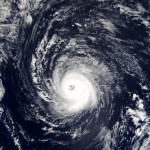Hurricane Trivia
 Tuesday, July 20, 2010 at 11:35AM
Tuesday, July 20, 2010 at 11:35AM  1. Hurricane season runs from ...
1. Hurricane season runs from ...
A. May through October
B. May through November
C. June through October
D. June through November
The answer is D: Officially, hurricane season runs from June 1 through Nov. 30.
2. On average, what are the peak months of the hurricane season?
A. June/July
B. July/August
C. August/September
D. September/October
The answer is C: Ocean temperatures are highest during late August and into September, helping to fuel storm generation.
3. How long is the average life of a hurricane?
A. 5 days
B. 7 days
C. 9 days
D. 11 days
The answer is C: 9 days.
4. How many hurricanes are in the average season?
A. 2-4
B. 4-6
C. 6-8
D. 8-10
The answer is C: 6-8.
5. How many Category 5 hurricanes have hit the United States since 1899?
A. 3
B. 4
C. 5
D. 6
The answer is A: 3. In 1935, a Category 5 hurricane hit the Florida Keys, Hurricane Camille devastated the coast of Louisiana and Alabama in 1969, and Hurricane Andrew hit South Florida in 1992.
6. What is the origin of the word “hurricane?"
A. The name of the Carib god of evil
B. An Aztec word for "strong wave"
C. A Portugese coastal town
D. A mythical sea monster that devoured sailors
The answer is A: "Hurricane" is derived from "Hurican," the name of the Carib god of evil. The Caribs are the native inhabitants of the Caribbean.
7. What were the first tropical cyclones named after in the late 1800s?
A. Girlfriends
B. Politicians
C. Friends
D. Philosophers
The answer is B: Legend has it that the first named storms were those that were unofficially named for Australian politicians in the early 20th Century by a disgruntled weather forecaster there. During World War II, American forecasters in the Army Air Corps named tropical systems after wives and girlfriends back home.
8. True of False: You should leave one window open during a hurricane to prevent your house from exploding.
The answer is False: Pressure differences will not cause your house to explode. All windows and doors should be shuttered to protect against wind and flying debris.
9. At what wind speed does a tropical storm become a hurricane?
A. 39
B. 50
C. 74
D. 100
The answer is C: Storms with winds of 74 mph or higher are classified as hurricanes.
10. In 2004, what rare hurricane related weather phenomenon occurred?
A. No hurricanes with U.S. landfall
B. A hurricane in the Southern Atlantic
C. No tropical systems in the Eastern Pacific
D. A hurricane off the coast of California
The answer is B: In March 2004, a hurricane in the Southern Atlantic Ocean made landfall in Brazil. Tropical storm systems normally occur in the Northern Atlantic, the Indian Ocean, and throughout the Pacific Ocean.


Reader Comments